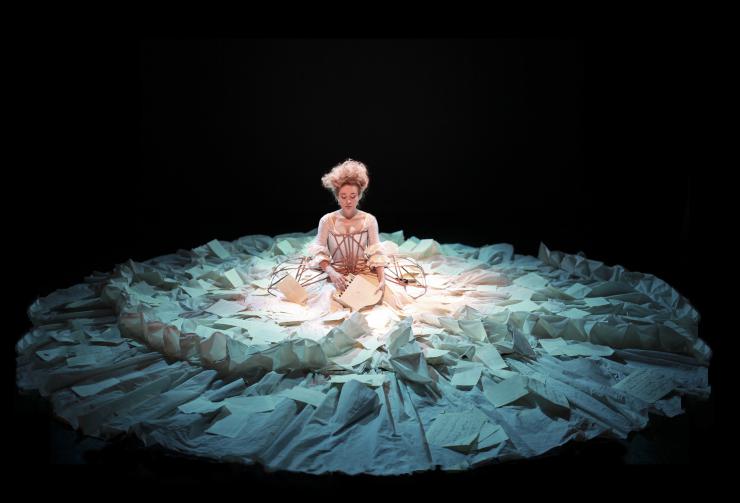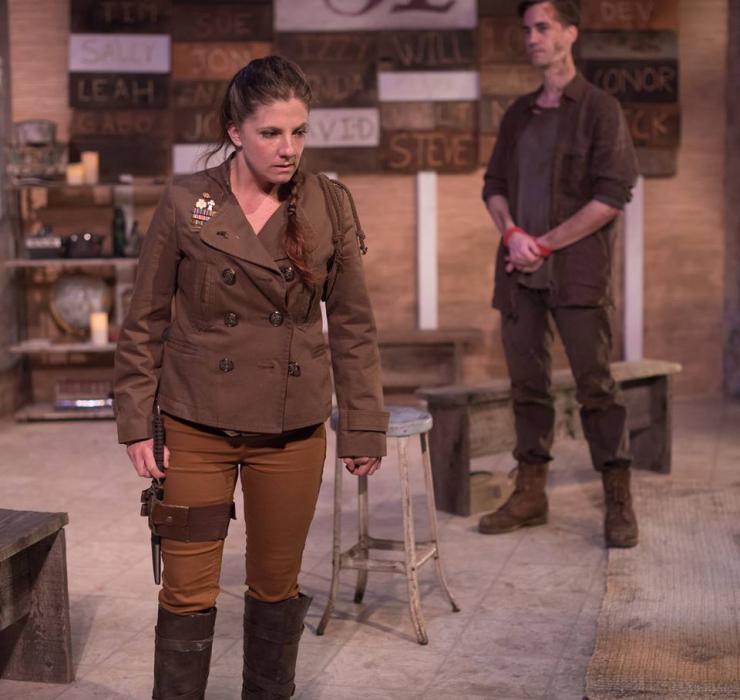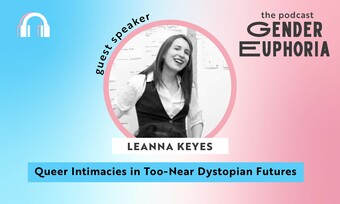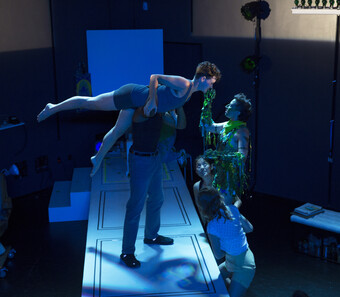What Is a Feminist Play, Anyway?
Getting Specific
What does it mean to describe a play as feminist? What are you looking for when you put out a call for "feminist" scripts? This series is an exploration of possible answers from different angles by WIT Online, a journal of the League of Professional Theatre Women.
Last year, playwright Elaine Romero put out an informal call for feminist plays. I wanted to participate, and as I looked at my body of work to select a play, I went into a bit of a tizz. What is a feminist play? Are all my plays automatically feminist just because I am a feminist? I’ve had that call for scripts in the back of my mind for a while, wondering what it means for my own work and for interpreting work generally. In this series of blogs, I will open that question up to the hive mind. What is a feminist play? Can a feminist play be written by a man? Does the main character have to be a woman? Does that woman have to be “good” or “right” or fighting for her rights or what, exactly, what? In starting to stir these questions in my own mind, I decided to go back to the source, and get a definition from Elaine Romero.
“At this point, I've allowed the playwright to self-select their own definition and feminist identity,” says Romero. “It has worked beautifully. I have not received work that did not meet my thought of what feminism would operate like in a play. In terms of the Bechdel Test, I think it's how you apply it. I love the test as an eye-opener of what happens to female characters often on stage. And as with all things, I hate the idea of a test that tells us what we should or should not do.”
I like the openness of that, but still craved a specific and definite example. I found one.
Can a feminist play be written by a man? Does the main character have to be a woman? Does that woman have to be ‘good’ or ‘right’ or fighting for her rights or what, exactly, what?
Sylvia Milo’s play The Other Mozart is a monodrama about Mozart’s sister and fellow composer Maria Anna (Nannerl) Mozart. “Virginia Woolf in “A Room of One’s Own” imagined what would have happened if Shakespeare had an equally talented sister. With Nannerl Mozart we can actually trace what happens—from well-documented contemporary accounts and newspaper reviews of both children touring as two child prodigies, through the practical decision to put all family resources toward Wolfgang’s success, all the way to Nannerl’s marriage and her playing alone on a broken harpsichord. We don’t have to imagine, and her story is symbolic of so many other women’s stories,” says author and performer Milo. (Read a previous piece about The Other Mozart in this series here.)
Here is a play I would call explicitly feminist, a play about a forgotten and suppressed history, about an artist lost for no reason beyond her sex. The stereotypical rap on explicitly political plays (including feminist ones) is that they are agit-prop, not real art, or they are boring. But The Other Mozart boasts a terrifically theatrical set-and-costume-in one:

Says Milo, “The show is set in and on its costume: a stunning dress created by Polish designer Magdalena Dąbrowska, some eighteen feet in diameter, which spills over the entire stage. Its centerpiece is a corset sculpture by Miodrag Guberinic. In the dress are hidden all the props used in the performance. For much of the play it reads more as Nannerl’s world than as a garment. Miodrag created the sculpture as a cage: panniers stripped of all but their skeleton, revealing a device as much of torture as of fashion. Together these symbols of womanhood and status begin as playthings and gradually become her responsibility.”
But what about stories that are not specifically about women, or women’s history, or even written by women? Mac Roger’s sci-fi trio The Honeycomb Trilogy which includes the plays Advance Man, Blast Radius, and Sovereign wouldn’t seem to belong in the same universe as The Other Mozart. These are two-act, multi-character, science fiction extravaganzas. They each pass the Bechdel Test—full of women (and men) who have plenty to say, and not much of it about romance. The main character, Ronnie (short for Veronica), is a true hero. But she’s not always a particularly noble character. She makes compromises and flawed decisions and brutal sacrifices on her way to victory. And that is why I would call these feminist plays. They may not be “about” feminism, but they are the type of work a feminist would be happy to act in or direct or design.

I asked Rogers if this was a specific choice of his and how it came about.
“For a very long time as a younger playwright (I'm talking college-age and a few years thereafter), I had a fiendishly hard time writing women as protagonists, and sometimes I struggled to write women at all...I don't know what flipped the switch for me, but it suddenly occurred to me at some point in my 20s: ‘What do you mean you can't write women? You're surrounded by women! Just pay attention!’ I think a lot of well-intentioned men think the mistake is that they're not making women awesome or badass enough, and try to correct for that by either making women the ones who are always the morally right voice in any conversation, or they write them to know tons of kung-fu and shooting and show them kicking a bunch of dudes asses. Some of this stuff has its place, but to me it’s not a replacement for what I see as the more crucial mistake men make writing women: we don't make them fully human. They're symbols of strength, or moral uprightness, or our own resentment at rejection, or any number of things along those lines, but they're projections of our fears and desires, not freestanding characters.”
This brings me back to Elaine Romero’s very open definition, so I’ll include some of her recommendations. You could start with her play Catalina de Erauso. She also lists Rapture, Blister, Burn by Gina Gionfriddo, The Bachelors by Caroline V. McGraw, Gum by Karen Hartman, Dry Land by Ruby Rae Spiegel, Bliss (or Emily Post Is Dead!) by Jami Brandli, and Behind the Eye and Lasso of Truth by Carson Kreitzer.
That’s a very partial list. I would love to see more examples and recommendations in the comments. Because “what is a feminist play anyway?” isn’t a question I’m answering in this blog series. It’s a question I’m asking.












Comments
The article is just the start of the conversation—we want to know what you think about this subject, too! HowlRound is a space for knowledge-sharing, and we welcome spirited, thoughtful, and on-topic dialogue. Find our full comments policy here
I would recommend Veils by Tom Coash. A two-person play about two Muslim women, one American one Egyptian, at university in Cairo at the beginning of the Arab Spring.
A feminist play embraces feminist politics and points of view. It's not enough to say a play where a woman character is three-dimensional and has agency is a feminist play. What if this three-dimensional character with agency actively supports patriarchal norms? Would that be considered a feminist play? Catherine Bailey Kyle's article "Her Story, Too: Final Fantasy X, Revolutionary Girl Utena, and the Feminist Hero's Journey" in the anthology Heroines of Television and Film: Portrayals in Popular Culture is a good place to start and goes beyond the Bechdel Test. There are other writers and scholars who have examined this issue including Pearson and Pope's 1981 The Female Hero in American and British Literature (which does not cover theater) but which explores the heroic journey of women mostly in novels and some memoirs/non-fiction.
I was lucky enough to direct a developmental production of a powerful piece of feminist theater, Ann Gillespie's Choreographing a Rape Scene to go into a Feminist Play.
The characters are confused and conflicted about what “feminist theater” is, but the playwright is not. Through a series of incisively comedic incidents during a rehearsal process, Gillespie shifts the audience’s perspective on the ordinary aggressions of everyday life. Without preaching or hectoring us, she makes us reconsider the cost of being a woman (or a man) in America today.
And working on the play immediately in the wake of the Profiles Theater scandal made me view what I read in the media a bit differently.
I am trying to write a feminist play and collaborating with a female playwright on it because as a man, I know my limitations.
I believe to be a feminist play, women characters must be three-dimensional and have agency (which would include being in a situation which they can do anything about it but still struggle against it). Whether that is sufficient is another matter.
I'd consider Patricia Milton's play Enemies, Foreign and Domestic to be feminist. All four female characters are well-rounded. There is a question of one of the characters' agency, but the play puts that lack of agency under a microscope.
I believe men can write feminist plays, and I've tried to write feminist plays (not all of my plays, but some).
I believe my play Evil Fan (3F 1M) is feminist. The main character is female. There is a second character, male and dead, who kills the two supporting female characters, but they both confront him about it afterwards and one of them ultimately helps foil him. The main character solves her problem without the help of the male character. The play does pass the Bechdel test in one scene, but I believe that would not be sufficient or necessary to make the play feminist.
BTW, the link to Elaine Romero's site goes to a parking page.
A parking garage!?!! That is very funny and very wrong. I'll see if Editorial can fix the link. Thanks for noting it.
Sorry, I used jargon. I meant a page that a web host puts up while waiting for someone to create a website.
The link is fixed!
Thanks, Catherine. This question has been forward in my mind for my entire career, and I'm torn how to respond. A part of me wants to provide an answer that is as inclusive as possible. Given the centuries of plays where male viewpoints, experiences, (frequently linear) structures, and aesthetics have been centered and priveldged, I'm eager for people to embrace a "feminist play" as one that simply possesses a differently gendered entry point, lens, or architecture. I crave a nation whose instant reference to Churchill's "Top Girls", Hansberry's "Sign In Sidney Brustein's Window", Thompson's "The Crackwalker", Parks' "Venus", and Ruhl's "Passion Play", as iconic "feminist plays" is as nonchalant as today's recognition of the celebrated male-gaze dramas of Shepard, Mamet, and Wilson. But then again, I wonder if even the impulse to try to classify, categorize, or contain is more reductively-male in nature, and a "greater feminist" exercise is to envision how works of theatre can do more to advance our collective understanding of interconnection and human value, and upend entrenched individual and systemic prejudice and rigidity. Anything that seeks to do that is "feminist" in my mind (but there I go again with a container).
The irony here is that my play, "The Harassment of Iris Malloy", just premiered at People's Light, and generated enthusiastic but wildly varied responses with regard to its feminism. There seemed to be both a gendered and generational split between who perceived it (and why, and how) as a "feminist play" and who didn't (and why, and how). While it was absolutely my intention to write something that reflects/represents my feminist thinking and concerns, I also embrace the idea that when you create multi-dimensional characters confronting non-binary considerations, it leaves room for a wide array of interpretations. And that certainly was the case.
Iris is a story about a single mother in Atlantic City who finds herself in the position to potentially radically change her life. She makes a series of questionable moral/ethical choices to try to achieve this - choices that echo those of male war veterans who have trouble assimilating back into civilian life, of Springsteen-esque characters whose dreams of "getting out" overwhelm their family commitments, and other previously elevated male narratives. To a degree it asks audiences whether they will understand and forgive a woman for making the same kind of "selfish" choices that our society often forgives (and even sometimes romanticizes) men making. Interestingly, most women in the audience articulated how they felt empowered/understood/central thanks to where the play's greatest empathy and complexity resides, the exploration of the different deals women and men make, and the non-linear the structure of the work. Many younger men expressed a similar appreciation of the play. On the other hand, many men my age and older (I'm 45) articulated a concern that the women in the play were not making the "heroic" decisions they wished they would. This was certainly not universal (with the lead NPR critic being, thankfully, a prime example) and I'm possibly exaggerating this split, but it did seem like a large number of men had difficulty processing how the external pressures and expectations on the two women in the play influenced their choices, how the play's zig-zag structure served to underscore Iris' internal wrestling with her wishes and realities, and how these male audience member's notions of "heroism" where simply not part of the world of the play. It was amazing watching these men listen to women talking during post-show and pre-show discussions, try to interject their concerns, but then find themselves ultimately not at the center of the dialogue that followed. I don't know if that's evidence of a "feminist play", but I offer it as an example of one possible criteria, if criteria proves to be desired.
This is fascinating to read, Zak. It reminded me of a conversation I had with a playwright recently who said the feedback she was getting on one of her plays from Artistic Directors (many of whom are at or above the age you mention) was that her main character was too passive- wasn't taking control of her life enough.....whereas younger designers and directors who read it, of both genders, totally got it, that the main character's life was happening to her/around her, eventually landing her where she had to step into her own power. Interesting....
I would like to offer up Blue Surge by Rebecca Gilman as a feminist play that turns the standard definition (or assumption) on its head. It's an examination of the American class system, education, and what it means to have agency and whether or not that definition is fixed or movable. I saw it in London at a small fringe theater directed by a British man, and it was fascinating.